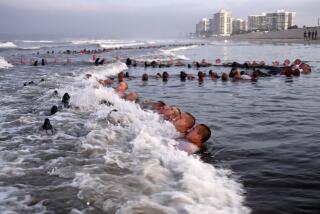House Panel Charges Navy Slanted Probe of Iowa Blast to Blame Sailor
- Share via
WASHINGTON — A House committee charged Friday that the Navy’s investigation of a fatal blast aboard the battleship Iowa was too quick to blame Petty Officer Clayton M. Hartwig, one of the dead sailors, and said the Navy probably should not investigate its own accidents.
The House Armed Services Committee, in a 48-page report on the April, 1989, explosion that killed 47 sailors, denounced the Navy’s inquiry as “an investigative failure” that produced “a hypothesis--and a tenuous one at that.”
The report charged that naval investigators, after concluding at an early stage in their inquiry that Hartwig “most probably” had set off the blast purposely, later tailored technical tests and psychological profiles to fit their belief.
“The technical investigation . . . was a flop when it came to the Hartwig theory,” the report said. “The police investigation performed by the Naval Investigative Service quickly ceased to be a full-scale investigation and was converted into something of a fact-gathering effort for a Hartwig murder-suicide theory.”
Hartwig’s family, speaking through attorney Craig Brusnahan, hailed the report as an “absolute victory” that vindicates the 25-year-old petty officer.
“Today, Clayton Hartwig’s soul can rest in peace. A great burden has been lifted off his family,” said Brusnahan, who represents Hartwig’s parents and his sister, Kathleen Kubicina, who sought the congressional review.
Brusnahan suggested that the family will sue the government for emotional damages caused by the Navy’s findings. However, he conceded that laws blocking servicemen or their families from suing the government would make that attempt “an uphill battle.”
The Navy, in a statement, said it stood by the conclusion of its five-month investigation, which is expected to lead to a number of lawsuits, including one by Kendall L. Truitt, a friend of Hartwig and the beneficiary of his life insurance policy.
“This conclusion was reached after an intensive investigation during which the Navy conducted more than 20,000 technical tests and ruled out possible accidental causes, including mechanical failure, friction, propellant instability and personnel error,” Navy spokesman Lt. Mark Walker said.
The Armed Services Committee’s investigations subcommittee, headed by Rep. Nicholas Mavroules (D-Mass.), charged that the Navy investigation contained “serious errors,” including lapses in collecting and safeguarding key physical evidence.
When evidence came to light of a possible motive for Hartwig’s alleged role in the explosion--a $500,000 insurance policy on his life--investigators began to shape evidence to fit theories of his guilt, the report said.
“When the investigators learned that Hartwig owned a timer, the technical tests ‘proved’ a timer could have ignited the blast,” the report contended. “When the timer information proved to be false, the technical tests suddenly found a chemical detonator to be the logical igniter. Again, there was an excess of certitude,” the House panel reported.
As a result of the report’s findings, Armed Services Committee Chairman Les Aspin (D-Wis.) proposed that, in the future, the Navy call on another government agency to conduct investigations of major accidents.
“Our experience in this probe points out the inherent evils in any organization investigating itself,” Aspin said. “If the organization blames anything other than itself, the result lacks credibility with the public.”
Navy officials sharply rejected Aspin’s proposal, noting that its centuries-old tradition of investigating its own accidents has resulted in many harsh punishments that did not always serve the Navy’s interests. They added that having an outside organization conduct investigations would be more costly.
“Who better to conduct those sorts of investigations than the experts?” one naval officer asked. “The reason we do that is not because we’re trying to cover up anything but because we have the experts in the areas being investigated.”
In its statement, the Hartwig family singled out for criticism Rear Adm. Richard D. Milligan, the director of the Navy investigation; Adm. Leon Edney, deputy chief of naval operations, and Adm. Joseph S. Donnell III, commander of the Atlantic Fleet’s Naval Surface Force.
“In their zealousness to fashion the facts to fit their scapegoat, they ignored something fundamental to this country and something they are sworn to uphold: the U.S. Constitution,” the Hartwig family said. “People in this country are innocent unless they can be proven guilty beyond a reasonable doubt. People in this country aren’t railroaded based on innuendo, hype and conjecture.”
More to Read
Get the L.A. Times Politics newsletter
Deeply reported insights into legislation, politics and policy from Sacramento, Washington and beyond. In your inbox twice per week.
You may occasionally receive promotional content from the Los Angeles Times.











